#introverted thinking
the most anti fe and anti ti show ever
fe users watch this to train your mind agaist the awkward.
example of being a thinker (and maybe especially fi polr)
is watching a video like this
then thinking something like this:
“these people keep crying how poor they are (and i’m sure it is terrible) but then they make 3-4 kids (optimistic much?) so they can suffer too… they believe "god will help us” or something like that. then they get shot by a bullet in a gang ruled slum, then they blame government.
as opposed to feeling something like this:
this guy is so inspirational, so much respect for him, he loves his parents, he fought against all odds etc.
…
because as a thinker with fi polr i further think this:
he is an exception. so what if one guy succeeded? what about all the OTHERS (fe) failed? how can i ignore all those people getting rekt and then just feel for this one guy positive things?
Today, there are an estimated 1,000 favelas in Rio, and they are home to about 1.5 million people
wss is much better than twfp of course
car salesman entp’s ti performance can not be as good as philosopher entp’s ti performance, let alone janitor entp’s ti performance. believing all these entps share the same exact performance level is ridiculous.
ti is not conditional logic. ti is prefering logic over ethics. ti is also preferring to solve problems by really understanding every element of that problem as opposed to trusting an authority.
quality or speed of ti do not have to be very high in every entp.
ti is doing the reasonable thing, given what you know, ignoring ethics. for example pulling the lever in trolley dilemma, thinking “huh? where’s the dilemma here? kill 1 instead of 2 of course.” but a person who use fi will think “if i pull the lever, i kill that one guy who was not going to die under normal circumstances, i am absolutely responsible for his death therefore.”
it doesn’t matter HOW FAST you reach one of those conclusions.
if ne can come up with super tangential associations, se can come up with directly related associations. synonyms of a word for example has NOTHING to do with ne. NOTHING! because synonyms are DIRECTLY the same thing with the base word.
or, if you give a word like rabbit to se user, he can come up with a word like carrot because it’s directly what rabbit eats. you don’t need INTUITION for that association.
and once again, everybody can automatically say who is your mother’s son. no logic required. therefore, further steps you add to that question only challenges your working memory, not logic.
Manipulators seek to dominate and control your decision making, see Manipulative Behavior for more detail. Some common examples of manipulative tactics:
Si: throws past issues/mistakes at you
Ni: uses knowledge of you against you
Ti: gradually chips at your self-esteem
Fi: twists your sense of loyalty or morality
Se: evades, distracts, makes excuses
Ne: empty promises, tries to confuse you
Te: shuts down discussion/disagreement
Fe: exploits your emotional vulnerabilities
Ti Dominant: I have all the knowledge. Resistance is futile. Resistance against the superiority of my brain, that is.
Ti Auxiliary: And I’ll use all that knowledge to BLOW STUFF UP YOLO. :D
Ti Tertiary: Or help the human race?
Ti Inferior: I KNOW I’M IRRATIONAL BUT I REFUSE TO ACCEPT IT. TRUTH WHAT TRUTH THIS IS A PLACE OF BLISSFUL SELF-DELUSION.

Colonel Mustard: Extraverted Thinking (Te)
Col. Mustard organizes everyone into search parties and tries to get control of a chaotic situation. He’s a military man who wants to do things by a strict, military standard, especially when everyone else is freaking out. He understands that if they split into pairs, one of them might be paired with the killer and thus get killed themselves, but it seems like a simple way to find out who the killer is. This is war, after all, and they have to win despite the risk of casualties. He directs the piling of the corpses on the sofas, pointing out the optimal way to get them to fit when the others struggle to position them properly. He demands straight answers from Wadsworth about who is in the house, and gets frustrated with the complicated replies.
Best Suggestion: ESTJ

Professor Plum: Introverted Thinking (Ti)
Professor Plum analyzes people for a living, and tends to reduce them to a series of logical principles. After Mrs. Peacock rambles on at dinner, he picks apart her behavior and diagnoses her with a form of insecurity. When the others are trying to figure out which of the weapons they were given was used to kill Mr. Boddy, Plum reasons that it might have been something else entirely—poison! In the “real” ending, Plum is the one who kills Mr. Boddy (who’s actually Mr. Boddy’s butler posing as Mr. Boddy; it’s complicated), but his plan is needlessly complex, first faking Boddy’s death and then sneaking back when no one is looking to kill him for real a second time.
Best Suggestion: INTP

ENFJ – the Giver, the Mentor, the Believer
I’ve no idea if it says anything about the franchise that the biggest nemeses in two different Star Treks are ENFJs. Even TNG had Lore, the ENFJ cult leader. Seems like Star Trek may have a running theme about the dangers of following crazed, charismatic leaders with big but empty promises.
(P.S. I feel really gross using my cheesy terms like “Believer” and “The Garden Fountain” for someone like Dukat, but that’s the format.)
Dominant Function: (Fe) Extraverted Feeling, “The Garden Fountain”

Gul Dukat needs to be loved. We all do, of course. Dukat, however, lives and breathes off the adoration, honor, praise, and hero-worship of others—which he never gets.
Back when he was made Prefect of Bajor during the Occupation, Dukat believed a gentler approach was needed. He enacted policies to ease the burden on labor camp workers, but strangely, the Bajorans failed to show appreciation for his compassion. They seemed to dislike being occupied by an invading force no matter how nice he was about it. They continued to resist him, and Dukat felt compelled to strike back and punish their ingratitude.
This cycle describes much of Dukat’s life and career. He wants to lead, but when his subjects or fellow leaders don’t like him, he struggles. He either overcompensates and looks desperate, or lashes out and becomes the angry tyrant he claims not to be.
Dukat is ready to kill Ziyal, his secret half-Bajoran daughter with a Bajoran woman, to preserve his reputation in the Union. He makes a hard choice to keep her alive and accept the disgrace, and then spends the rest of her short life trying to make sure she knows him as a good man. She falls for it (largely, I believe, because she is an ENFJ as well, as least in her final incarnation), and when she’s killed, Dukat loses the last attachment he had to any kind of innocence.
Nevertheless, Dukat is a skilled orator who can see which way the political wind is blowing and talk his way into positions of influence and power. He works his way up from disgrace as the Prefect of Bajor, then again after the reveal of Ziyal, this time masterminding Cardassia’s alliance with the Dominion. He gives fantastically inspiring speeches to the Cardassian people, promising a return to greatness and a purifying of the Union from the presence of its enemies.
And when that role fails him, he appoints himself leader of a cult of gullible Bajorans in the ways of the Pah-wraiths. His final con finds him seducing the Kai herself into believing he’s a simple Bajoran farmer, leading her down his dark path with flattery and appeals to her ego. The two Fe-doms decide that Bajor is worthy of neither of them, and must be destroyed.
Dukat gets exactly nowhere trying to seduce the two Fi-dom leaders of DS9. He makes continued creepy advances on Kira, hoping to win her heart, but she resists (especially when he reveals that he had a relationship with her mother, which makes him more attracted to her and her more disgusted by him). He straight up kidnaps a wounded Captain Sisko and pretends to care for him on a deserted planet, hoping that Sisko will finally see how wonderful a person he is; but Sisko isn’t having it, ultimately deciding that there is nothing redeemable at all about the man.
Auxiliary Function: (Ni) Introverted Intuition, “The Labyrinth”

Dukat survives despite repeated failure thanks to his ability to see a way forward in any situation. No matter how far he falls, Dukat has a vision to climb back to power—crusading against rogue Klingons in order to avenge the honor of Cardassia, or allying the Union with the Dominion, which temporarily makes him the leader of one of the greatest powers in the Quadrant. He believes in the superiority of the Cardassian people, and their sovereign right to rule the galaxy, which justifies any decision he makes that causes harm or distress to inferior races like the Bajorans.
He’s completely deluded about his own importance, idealizing all his actions into a mythology of a great man unappreciated in his time. Any criticism that cuts at that vision makes him defensive and angry. While his foresight can sometimes make him a canny political strategist, his overconfidence can also blind him to his enemy’s moves—for instance, when he’s stranded on DS9 by a security program left there by his superiors, who distrusted his loyalty.
Dukat’s final ploy involves following the path of the Pah-wraiths, the devils of Bajoran religion, in an ultimate grab for cosmic power.
Tertiary Function: (Se) Extraverted Intuition, “The Kitchens”

Dukat’s Se sometimes leads to him running through aggressive loop behavior, enacting more extreme measures and harsh punishments to gain control of his image. He can make ruthless decisions in the moment, and fight his way out of a corner. Despite being a devoted husband and father, he enjoys the company of Bajoran comfort women, which leads to his affair with Kira’s mother and his illegitimate daughter. He’s wily and quick, and survives no less than five assassination attempts during his tenure as Prefect of Bajor.
Inferior Function: (Ti) Introverted Thinking, “The Laboratory”

Like all Cardassians, Dukat was raised with strict mental discipline, and can even resist the intrusion of a Vulcan mind meld. That said, he lacks the ability to examine his obsessions critically, and melts down rather quickly when robbed of his goals. After Ziyal is killed, he loses his mind and can no longer function as anything but a purely emotional, rage-driven creature.
His biggest personal breakthrough is to realize at last that the Bajoran people will never love him. He decides they are weak, inferior creatures who don’t deserve his love. It’s their fault—and Sisko’s, and Kira’s, and everyone else’s—for not understanding him.
Dukat enacts a plan to wipe out Bajor, eventually ending up defeated by Sisko and knocked into some sort of cosmic hellscape, where he no doubt spends eternity blaming everyone in the galaxy for his failures.

INFJ – the Counselor, the Seer, the Defender
Wait, haven’t we seen this guy before? No, it’s not because Weyoun is a clone, it’s because Jeffrey Combs played another DS9 villain, Brunt. They even appeared in the same episode once, though sadly, not in the same scene.
Two Weyouns once appeared in the same episode, too, because the character we know as Weyoun is actually a series of clones (Weyouns 4-8 during the run of DS9, to be specific). However, because he’s genetically engineered to do his job perfectly, he always has the same personality, even when he turns out “defective.” In MBTI, your type is generally a function of nature rather than nurture—you are wired the way you’re wired no matter what, though personal experience will influence how your functions manifest. In Weyoun’s case, his “nature” is embedded in his DNA by those who “nurture” him, the Founders he reveres as gods.
Dominant Function: (Ni) Introverted Intuition, “The Labyrinth”

Weyoun believes in the mythos of the Dominion—that the Founders are gods who bring order to the galaxy. He believes that the Dominion will endure for thousands of years after the Federation is gone, and works to advance their holdings and influence with every move he makes. He believes that his goals are divinely inspired by the Founders, perfect and not to be questioned.
Even the defective Weyoun 6 still holds the Founders in awe and reverence, even though he awakens from the cloning process with the inexplicable idea that the Dominion’s war efforts are wrong.
Weyoun always works with a hidden agenda, a far-sighted goal for the Dominion’s gain—Bashir’s genetically engineered friends can tell that he’s thinking big picture, years or centuries ahead. He arranges peace-talks with the Federation over a new proposed border, playing nice and taking an apparently disadvantageous deal when actually it will give the Dominion access to a planet with a fungus helpful to their Ketracel-white production. He and Sisko make small talk about the minefield Starfleet has put up in front of the wormhole, but both Intuitives know that the real meaning of the conversation is that they’re about to go to war.
Weyoun sizes people up quickly, searching for the clue that will give him the advantage over his diplomatic targets. Damar accuses the whole Weyoun line of having an innate flaw of overconfidence, never doubting the success of their vision. The final Weyoun understands immediately when Damar’s rebellion destroys a cloning facility, that Damar’s true goal is to keep any more Weyouns from being made.
(Although do we seriously believe Weyoun doesn’t have more copies of himself squirreled away somewhere? Please.)
Auxiliary Function: (Fe) Extraverted Feeling, “The Garden Fountain”

The Dominion’s aim is to conquer and subdue all worlds in the galaxy, but Weyoun makes it sound like a wonderful club that you’d be silly not to join.
Weyoun speaks with grace and eloquence, aiming for compromise and mutually beneficial agreements (in fact, his negotiating tactics have a lot in common with those of Quark, an ESFJ). He’s politically adept, and genuinely tries to have good working relationships even with those he disagrees with. In diplomatic discussions, he can play wounded as well as confident, keeping his adversaries off balance so he can emotionally ply them to get what he wants.
Weyoun orchestrates the alliance with the Breen, treating them like old friends as soon as the deal is made. This infuriates Damar, who Weyoun snubs in order to keep him in his place. When the Cardassians start rebelling, Weyoun gives grand speeches about the spirit of cooperation. He feigns sadness that he has to order mass executions in order to ensure obedience, gaslighting the people into believing their deaths are their own fault.
The “defective” Weyoun 6 still wants the Dominion to succeed, but he also wants peace for all people. He can’t completely betray the Founders, and so he defects to Odo, the only Founder on the opposite side of the war, hoping to start a process that will convince the other Founders to change the Dominion’s course. He fails, but still desires Odo’s favor and blessing before he dies.
Weyoun’s emotionally manipulative tactics do have consequences.
Weyoun 5 dies in a mysterious transporter accident, possibly arranged after Damar got sick of his arrogance. Weyoun 7 gets himself killed after prodding Ezri about her feelings for Bashir, thus enraging Worf, who snaps his neck. Weyoun 8 gets himself killed after mocking Damar’s rebellion, and the destruction of the planet, prompting Garak to shoot him.
He dies in service to his Founder, loyal to the end.
(But again, there are more of him, right?)
Tertiary Function: (Ti) Introverted Thinking, “The Laboratory”

Weyoun can be cold and direct when he needs to be, as when he demands the removal of the minefield. He quickly segues into flattering persuasion mode afterward, of course. He delivers sharp insults when necessary as well, never afraid to call out Dukat’s tiresome egotism or Damar’s stupidity. He incisively interrogates the intruding Jake and Nog, assuming they’re conspiring against him, but when they lead him to Dr. Giger’s immortality machine, he’s intrigued by the mad scientist’s ideas.
Auxiliary Function: (Se) Extraverted Sensing, “The Kitchens”

The Founders did not see fit to create the Vorta with a sense of aesthetics. With his weak eyes, Weyoun can’t appreciate art, though he does try. He examines Ziyal’s paintings and asks Kira if they’re “good.” She’s not helpful, and Weyoun decides if the Founders had needed him to enjoy art to do his job, they’d have programmed him with the ability.
Weyoun 6, however, decides to indulge when he defects. Freed from the constraints of his duty, he goes a little crazy trying all kinds of new foods from the replicator. He takes particular delight in pepperoni pizza. The normal Weyoun disdains his working partner Damar for his obvious drunkenness, while at the same time appearing to have a secret hope of watching the captive Worf and Ezri “comfort each other.”
No wonder Worf snapped his neck.
Fortunately, there’s another Weyoun waiting to take his place, because the universe can’t get rid of him that easily (I believe in Weyoun 9, is what I’m saying).
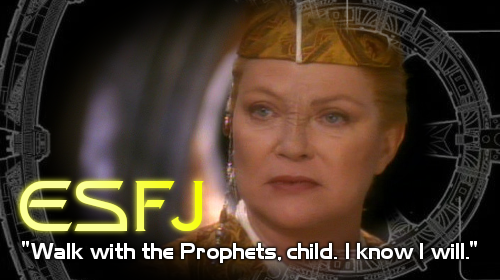
ESFJ – the Provider, the Facilitator, the Caretaker
A smiling, self-righteous old lady enters the place our family of misfit characters calls home and immediately sets everyone on edge with her overbearing rules and conspiratorial grabs for power.
Nope, we’re not profiling Dolores Umbridge today. It’s Star Trek’s own Space Pope, the chillingly wicked Kai Winn. DS9 has some truly lovely Fe-doms on board, but Winn brings the Mean Girl-ness to a religious level.
Dominant Function: (Fe) Extraverted Feeling, “The Garden Fountain”
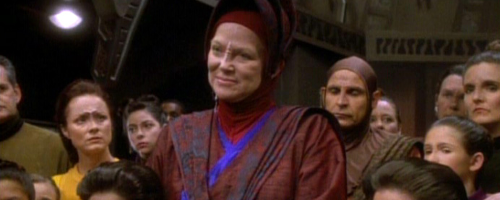
When Winn Adami first saw the wormhole—or the Gates of the Celestial Temple, as her people believe them to be—she felt nothing. All her fellow Bajorans around her, however, reacted in awe, and Winn felt she had to display the proper response. She never has a personal experience with the Prophets her entire life, but rather loops through her Fe-Ne, playing along with the Bajoran faith to pretend that she believes what everyone else believes.
Her rise to power is driven by her need to be seen as more righteous than others despite her insecurities. She finds it deeply distasteful that the Prophets chose an outsider like Sisko as their Emissary. She can’t even get out of his shadow after she ascends to Bajor’s highest religious position. Winn speaks sweetly even to her enemies—perhaps more so—and passive-aggressively insults those she dislikes, always acting shocked when someone (usually Kira) calls out her true motives.
Winn does try to do some good. As a young ranjen, she convinced her superior to take a more active role in fighting the Cardassians, and was able to use gemstones from the tabernacle to bribe Cardassians for small acts of kindness. This saved a precious handful of lives. She confronts Kira for acting like only the members of the Resistance put up any kind of fight during the Occupation.
Winn is outspoken as head of her order, though she’s disappointed that they don’t have as influential a voice as she thinks they should. She sees the Federation and its allies as intruders who will negatively influence Bajoran culture, and leads a boycott against Keiko’s school on charges of blasphemy. The whole show is secretly an assassination plot against Vedek Bareil, her chief rival for the position of Kai, and a more progressive and popular leader than she is.
Whenever someone else threatens to steal her spotlight, Winn’s conspiratorial wheels start churning. She supports the return of the long-lost Akorem Laan as the new Emissary rather than Sisko—that he brings back the traditional caste system doesn’t hurt either. She digs up dirt on Bareil during the election for Kai, which wins her the position, and then makes friends with him when she needs his assistance to negotiate a peace treaty with Cardassia. He’s mortally wounded during the process, and Winn pretends to care about his physical well-being just long enough to complete the talks.
Then she decides he should die with dignity.
Shortly thereafter, Winn wiggles her way into the temporary position of First Minister, a blatant and dangerous combo of church and state. When Kira and former resistance leader Shakaar stand up to her, Winn acts deeply offended. But she quickly offers a statement of support for Shakaar once he’s elected the new First Minister.
Winn briefly begins to come around to Sisko when he discovers the lost Bajoran city of B’Hala. She helps him through his troubling visions, showing true concern and care, and really seems to speak from the heart when confronting Kira about her distrust of her motives and courage. Her diplomatic skills even shine when she negotiates a non-aggression pact between Bajor and the Dominion, assuring the obsequious Weyoun that they are nothing alike, “Nothing at all.”
But Winn’s insecurity gets the best of her, and she returns to her old ways when Sisko tries to unleash the Reckoning. She just can’t live with the idea that Bajor’s fate would be decided by a foreigner, and so she interrupts the process, claiming she did it to save Sisko’s son. Once she starts receiving visions from the Pah-wraiths, Winn tries one more time to redeem herself by confessing her problem—and her pride—to Kira.
Kira recommends that Winn step down, and the Kai feels immediately insulted that she should give up her position after years of faithful service. She resents that the Prophets have never personally spoken to her, and refuses to humble herself to them. Eventually, she gives herself over to the Pah-wraiths, and to a relationship with Dukat, and together they plot the destruction of Bajor.
Traditionally, XNTJs are the ones typed as the villains who want to destroy everything, but when an Fe-dom villain decides that everyone must pay, everyone better watch out.
Auxiliary Function: (Si) Introverted Sensing, “The Study”
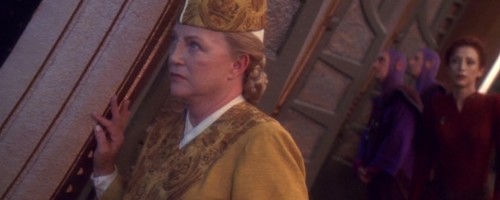
It’s easy to forget that every Bajoran we meet on DS9 only recently came out of a period of great suffering. Winn keeps her condescending composure quite well, but she tells Kira that she remembers “each and every beating” the Cardassians gave her during the Occupation. Though she’s never known the touch of the Prophets, Winn’s resilience in these times seems to serve as the one true touchstone of her faith.
That her endurance is never rewarded by the Prophets angers her deeply. Perhaps she’s looping too hard to appreciate her own personal experiences, reaching for an idealized religious experience that she imagines everyone else has had. When she finally turns on the Prophets, it’s after years of feeling neglected by them.
Till then, Winn holds to the orthodox practices of the Bajoran faith. She doesn’t want non-Bajoran scientific principles taught in the school, and she supports the old caste system during its brief return. She’s distrustful of outsiders and wishes the Prophets had chosen a Bajoran (maybe her?) as their Emissary.
Tertiary Function: (Ne) Extraverted Intuition, “The Hiking Trails”

Winn’s a master of pretense, quickly changing allies and stories to go with the flow of public opinion. Her ambition pushes her into greater positions of power, often before she’s had the experience to know what to do once she gets there. Though she’s initially frightened at the thought of leaving the religious establishment she spent her life in—and allying herself with Bajor’s greatest enemy—once she gives up the Prophets for the Pah-wraiths, she feels a delicious freedom she’s never known before.
Inferior Function: (Ti) Introverted Thinking, “The Laboratory”
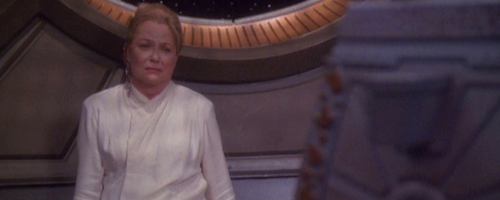
In private moments, Winn will sometimes let down her smiling façade and bite back at those who dare criticize her. She’s anxious and panicky in moments when she realizes her ambition has bitten off more than she can chew, and can’t discern her options. She’s cold and calculating in her grabs for power, and can dismiss the lives she must step on in order to get where she believes she deserves to be. Once her faith fails her, she sees the hard truth of her own hypocrisy, and then blames all her problems on the Prophets and the Bajoran people themselves.
In her final moments, she recognizes her error, and helps Sisko fight Dukat, moments before the Pah-wraiths incinerate her.
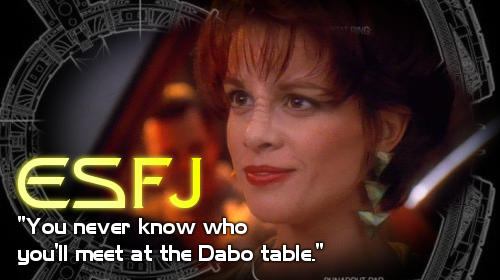
ESFJ – the Provider, the Facilitator, the Caretaker
Like Kira, Leeta’s a young Bajoran woman who survived the Occupation. While one of them picked up a gun, though, the other picked up some Dabo skills. Kira’s Fi-dom makes her edgy and angry, while Leeta moves through the world with an Fe-dom’s openness and generosity, making her living as the life of the party in the hub of DS9’s communal bazaar.
They both fall for some pretty weird Introverted dudes, though.
Dominant Function: (Fe) Extraverted Feeling, “The Garden Fountain”

Like her ESFJ boss, Leeta’s gift is hospitality. She entertains guests every day at Quark’s Bar, coaxing their energy up to keep the room lively. Her job is to make sure everyone is happy, enthusiastic, and spending money. She’s something of an amateur sociologist, which comes in handy considering all the diverse people she meets in her line of work.
Leeta’s a very skilled people-person, and quick to make friends. She’s barely known Jadzia for more than a few weeks (like, one episode) before Dax invites her to participate in the very intimate ceremony of sharing a consciousness with one of her past hosts. She coyly flirts with Julian, feigning illness to get his attention; and when it’s time to break up, she finds an amicable way to do it that ensures no hard feelings.
Leeta’s a good judge of character, and sees potential and lovability in Rom long before he does. When he starts a labor union, she helps get the bar employees on board, and encourages Rom in his cause. She waits for him to make the move when it comes to romance, which means she has to wait quite a while. When they have an argument that almost cancels their wedding, she has to vent to her friend Kira, an Fi-dom who patiently listens and then bluntly tells her she doesn’t really mean the angry things she’s saying.
Leeta leaves the station just before the Dominion invasion, accepting Rom’s wishes to keep her out of harm’s way. Before long she’s back, working the Dabo table while secretly joining Kira’s resistance. Now she’s the one fearing for Rom’s safety, as he’s been captured for his sabotage—but Rom doesn’t want to be rescued.
Leeta and Quark, anxious ESFJs that they are, can’t accept this, and they argue with Rom about how stupid he is for refusing their help. Leeta experiences a similar barrier when Nog returns from his surgery after losing his leg. Ezri has to hold back Leeta, now Nog’s step-mother, from comforting her traumatized step-son until he’s ready. When he is, Leeta joins in the family hug to welcome him back.
Auxiliary Function: (Si) Introverted Sensing, “The Study”

Leeta appreciates her Bajoran heritage, introducing Julian to the Rite of Separation when their relationship ends. She wants a traditional Bajoran wedding, and resists Rom’s efforts to get her into something more scanty for the ceremony. In her day job, though, she’s very comfortable in her own skin, and always looks great. She’s so comfortable, in fact, that she answers the door of her quarters without realizing she’s lost her towel.
(And a bit of non-canon info from the post-TV novels, because I think it’s cool: Leeta’s full name was never given because she was orphaned during the Occupation and never knew her family. Once she married a Ferengi, whose people have no family names, it didn’t matter anymore. She stuck quite happily with her single, unique name.)
Tertiary Function: (Ne) Extraverted Intuition, “The Hiking Trails”

Like any Bajoran who had to survive the Occupation, Leeta can be flexible and adaptable. After a few years of working at Quark’s Bar, she experiences anxiety over the lack of direction in her life, feeling like she should do more, and accepts a position at a distant starbase running their café. When Rom confesses his love to her, she changes course again, starting a new life as part of a Ferengi family. She sees the potential of Rom’s labor union, and demands more and better pay from Quark.
Inferior Function: (Ti) Introverted Thinking, “The Laboratory”

When she puts her mind to it, Leeta can be quite formidable. She studies up on the Trill zhian’tara ritual, and helps Jadzia explain it to the group. She’s insulted that Quark thinks she has no brains, appreciating her only for her physical assets, but she puts up a fight more than once when she figures out she can argue for better working conditions.
When she and Rom reach an impasse about signing a pre-nuptial agreement, she breaks off the engagement and complains to Kira about him. She’s trying very hard to convince herself she doesn’t like him, picking at any fault she can think of. But Kira knows she doesn’t mean it, and they eventually work out the problem.
Love between a Bajoran and a Ferengi is an inscrutable thing, but Leeta doesn’t have to think twice about it.
